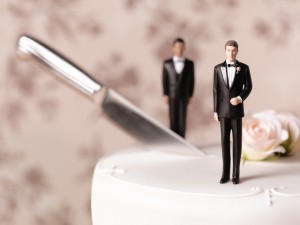Respecting Religion, Rejecting Discrimination Does SCOTUS decision manage to have its cake and eat it too?

In a 7-2 ruling issued June 4, 2018, the US Supreme Court found in favor of Jack Phillips, the owner of Masterpiece Cakeshop, Ltd., who refused to make a cake for a same-sex wedding. Phillips opened his shop in 1993 in Lakewood, Colorado, knowing full well that he would decline to make certain cakes over religious objections. “I didn’t want to use my artistic talents to create something that went against my Christian faith,” he said in a 2017 interview with CNN, noting that he has also declined to make cakes to celebrate Halloween. In 2012 David Mullins and Charlie Craig asked Phillips to bake a cake to celebrate their planned wedding, which would be performed in another state. Phillips said he could not create the product they were looking for without violating his religious principles.
Mullins and Craig filed a complaint with the Colorado Civil Rights Commission, which ruled in their favor, citing a state anti-discrimination law. Phillips took his case to the Colorado Court of Appeals, arguing that requiring him to provide a wedding cake for the couple violated his constitutional right to freedom of speech and free exercise of religion. The court held that the state anti-discrimination law was neutral and generally applicable and did not compel Phillips’ Masterpiece Cakeshop to “support or endorse any particular religious view.” It simply prohibited Phillips from discriminating against potential customers on account of their sexual orientation.
Although Phillips ultimately prevailed in his recent Supreme Court appeal, the majority opinion by Justice Anthony M. Kennedy relied on the majority’s conclusion that the Colorado administrative agency, the Colorado Civil Rights Commission, treated Phillips unfairly by being too hostile to his sincere religious beliefs in its ruling against him.
The opinion leaves open the future possibility that a business owners’ sincere religious beliefs might have to yield to the state’s interest in protecting the rights of same-sex couples, and importantly, the majority did not rule at all on a central question in the case—whether compelling Phillips to bake a cake for a same-sex couple would violate his right to freedom of speech. (Incidentally, the American Humanist Association sent an email alert the day of the ruling that suggested the ruling did address the substance of the religious liberty issue, but further review shows that was not the case.)
Kennedy wrote that Phillips “was entitled to a neutral decision maker who would give full and fair consideration to his religious objection as he sought to assert it in all of the circumstances in which this case was presented, considered, and decided.” Because Phillips did not have such a proceeding, the court concluded, the commission’s order—which, among other things, required the baker to sell same-sex couples wedding cakes or any other good that he would sell to opposite-sex couples and mandated remedial training and compliance reports—“must be set aside.”
“The commission’s hostility was inconsistent with the First Amendment’s guarantee that our laws be applied in a manner that is neutral toward religion,” Kennedy said, implying that while Americans may reject religion, our institutions must still respect religious belief. The application of the law must be equal regardless of one’s professed religious beliefs.
Justice Ruth Bader Ginsburg was joined by Justice Sonia Sotomayor in her dissent. “There is much in the [c]ourt’s opinion with which I agree,” Ginsburg wrote, but stressed that she “strongly” disagreed with the idea that the same-sex couple should lose the case. In particular, she argued, neither the commissioners’ statements about religion nor the commission’s disparate treatment of other bakers who refused to make cakes disapproving of same-sex marriage justified a ruling in favor of Phillips. “When a couple contacts a bakery for a wedding cake, the product they are seeking is a cake celebrating their wedding—not a cake celebrating heterosexual weddings or same-sex weddings—and that is the service [the couple] were denied,” Ginsburg wrote in her dissent.
While the court’s ruling was certainly a disappointment to progressive advocacy groups, many, including ACLU Deputy Legal Director Louise Melling, were encouraged that the ruling was narrow—meaning it does not set a broader precedent for future cases on religious freedom and LGBTQ rights. It also leaves unresolved broader constitutional questions on the scope of permissible religious liberty in the marketplace.
The silver lining here is that the case was decided on narrow grounds unlikely to have a profound impact on future case law. The majority opinion left open the possibility that a future case could be decided differently, particularly if the decision maker were to consider religious objections neutrally and fairly. Other cases, the Masterpiece Cakeshop majority emphasized, “must await further elaboration in the courts, all in the context of recognizing that these disputes must be resolved with tolerance, without undue disrespect to sincere religious beliefs, and without subjecting gay persons to indignities when they seek goods and services in an open market.” Importantly, in its majority opinion, the court reaffirmed the basic principle that businesses should not discriminate, including against LGBTQ people.
